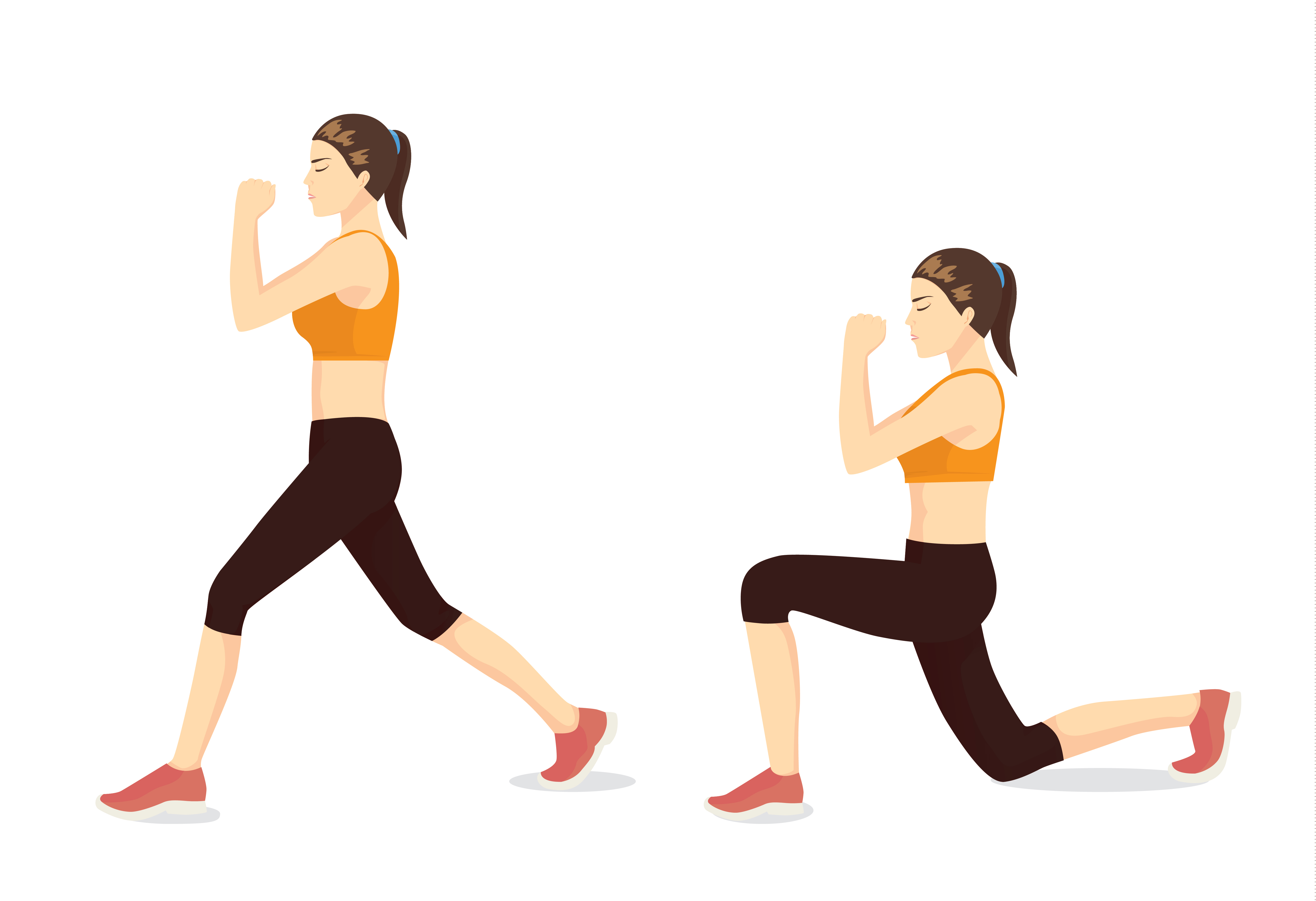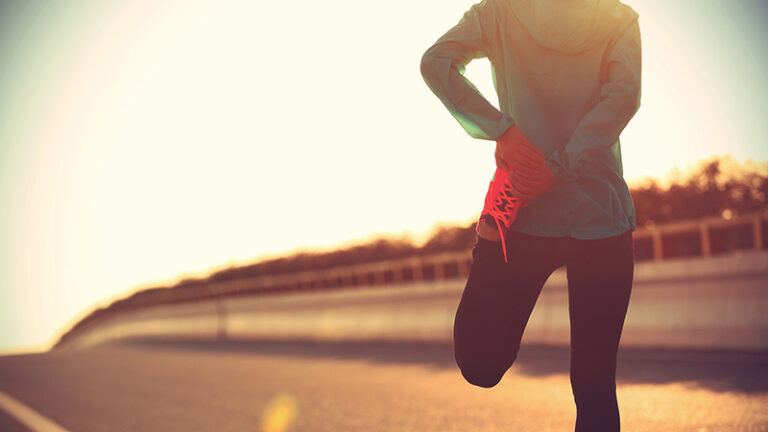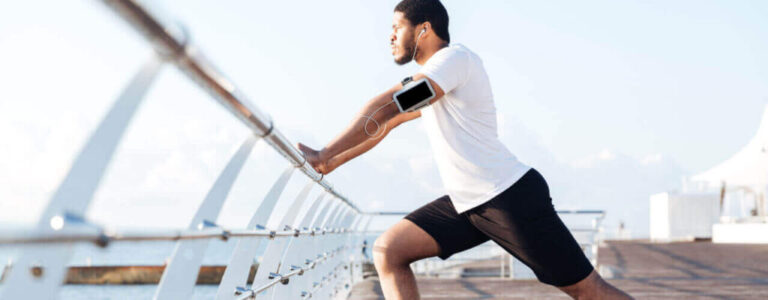The Top 12 Flexibility Exercises to Increase Your Range of Motion
Although stretching is typically associated with the start of a workout, recent study indicates that stretching may actually increase the risk of injury. Instead, you can condition your body for an effective workout and assist increase overall flexibility and mobility by engaging in modest aerobic workouts like walking, which can raise your heart rate and blood pressure.
Becoming flexible takes time but is well worth it ‒ this is an important step that will prevent workout-related injuries like muscle strains, tears, and sprains because you’ll have a fuller range of motion during your workouts.
If you’re looking to introduce flexibility exercises into your workout routine, we’ve rounded up 12 below.
The 12 Best Flexibility Exercises for Improving Your Mobility
1. Dynamic Lunges

Directions:
- Stand with one foot behind you and one foot in front, about two to three feet apart.
- With your weight on your back leg, bend your knees and lower your body until your back knee is a few inches from the floor.
- When your knees are bent, your front thigh should be parallel to the floor and back knee should point toward the floor.
- Push back up, keeping your weight on the heel of your front foot.
- Continue for 5‒10 reps before switching foot positions.
Muscles stretched:
Glutes, hamstrings, quadriceps, calves
2. Stair Calf Stretch

Directions:
- Stand on the bottom step with your heels hanging off of the edge.
- Slowly drop your heels down. Hold on to the wall or stair rail as you lower down.
- Hold this position for 20-30 seconds.
- Repeat two to three times.
Muscles stretched:
Calves, Achilles’ tendons
3. Lizard Pose (Utthan Pristhasana)
From VeryWell Fit

Directions:
- Begin in the Downward-Facing Dog
- Step your right foot forward, outside of your right hand. Make sure your foot comes all the way forward until your toes are in line with your fingers. Your right knee should be bent at a 90-degree angle and shouldn’t go farther forward than your ankle.
- Bend your elbows until your forearms are on the floor, keeping your shoulders above your wrist.
- To ensure your hips don’t sag towards the floor, press into your left heel to keep your left leg active. Hold this position for 10 seconds.
- To release the position, straighten your arms and bring your right leg back into downward-facing dog position.
- Hold this position for 10 seconds.
- Repeat the steps starting 10 times on each side.
Muscles stretched:
Hips, groin, inner hamstrings
4. Lying Quad Stretch

Directions:
- Lie on your right side on a mat or the floor with your legs extended straight away from your body, resting your head on your right arm on the floor to support your neck.
- Bend your left knee and pull your left heel up towards your left glute, using your left hand to grab a hold of the top of your left foot.
- Tighten your core to maintain stability through your pelvis; maintain this core tightness throughout the stretch. Keep your hips on top of one another so that you don’t strain your quadriceps and hip flexors.
- Gently pull your left heel and lower leg towards your tailbone, keeping your left thigh and knee resting on the inside of the leg on the floor.
- Hold this position for 30 seconds, then straighten the leg and squeeze your thigh.
- Repeat this two to five times, then perform this stretch on the opposite leg.
Muscles stretched:
Quadriceps, hip flexors extensor tendons (top of feet)
5. Overhead Triceps Stretch

Directions:
- Stand with your feet hip-width apart, or sit in a chair with your back straight.
- Lift your shoulders up toward your ears and then lower them back down. This prepares you for proper form, keeping your shoulders down during this stretch.
- Extend your right arm towards the ceiling, then bend at the elbow to bring the right palm toward the center of your back, resting your middle finger along the top of your spine.
- Use your left hand to gently push your elbow in toward the center and down.
- Hold this stretch 30 seconds for three to four repetitions on each side.
Muscles stretched:
Triceps, deltoids, lats
6. Standing Hamstring Stretch

Directions:
- Stand with your spine in a neutral position, feet hip-width apart.
- Place your right leg straight in front of you, then slowly bend your left knee.
- Gently lean forward while placing your hands on your bent left leg.
- Hold this stretch for 10 seconds, then repeat five to 10 times on each side.
Muscles stretched:
Hamstrings, calves
7. Cat Cow

Directions:
- Begin on your hands and knees with your hands directly under your shoulders and knees hip-width apart.
- As you inhale, move into cow pose by pressing your chest forward and up, allowing your belly to sink toward the ground.
- Slowly raise your head, relax your shoulders away from your ears, and look forward.
- As you exhale, come into cat pose. Round your spine upward, tucking your tailbone and drawing your pubic bone toward your belly.
- Repeat this 10 times.
Muscles stretched:
Shoulders, neck, hip flexors, lumbar and thoracic spine
8. Sphinx Pose

Directions:
- Lie on your belly, legs side by side.
- Set your elbows under your shoulders and forearms on the floor, parallel to each other. Lift your upper body away from the floor into a mild backbend, while squeezing your glutes together..
- Stretch your toes to the wall behind you. As you hold the pose, be sure to pull your hips toward your heels to protect your lower back.
- Activate your core and hold this pose for 15 seconds, then release your belly, lower your torso and head to the floor. Turn your head to one side and lay for five seconds.
- Repeat this stretch two or three times.
Muscles stretched:
Shoulders, abdominals, glutes
9. Shoulder Rolls

Directions:
- To start, stand with your arms by your sides and your feet about shoulder-width apart.
- Rotate your shoulders forward in big circles; repeat the movement about 10 times.
- Reverse the rotation ‒ make the circles in the opposite direction, moving backward. Repeat this motion 10 times.
Muscles stretched:
Upper back, shoulders, chest
10. Wrist Figure 8’s

Directions:
- Interlace your fingers in front of your body. Keeping your elbows tucked into your sides, move your interlaced hands in a figure eight motion.
- Allow your wrists to rotate fully so that each hand is alternately on top of the other.
- Repeat this stretch for 10 to 15 seconds at a time.
Muscles stretched:
Wrists, forearms
11. Knees to Chest

Directions:
- Lie on your back with your knees bent and your feet flat on the floor.
- Raise one bent knee up, grabbing your lower leg with interlaced fingers under your knee.
- Gently pull your bent knee toward your chest.
- Make sure to keep your muscles relaxed as you perform this stretch.
- Hold for a few seconds before returning your leg to the floor.
- Do the stretch about 10 to 15 times, alternating sides.
Muscles stretched:
Lower back, hamstrings
12. 90/90 Stretch

Directions:
- Sit on the floor and bend one leg in front of your body. Position yourself so your lower leg and knee are resting on the ground. Your leg should form a 90-degree angle, and your ankle should be neutral so your foot is pointing straight.
- Position your other leg beside you with your hip rotated inward and your shin and ankle on the ground. Bend your knee so your leg forms a 90-degree angle. Your back knee should be in line with your hip, and your ankle should be neutral.
- Try to keep your back straight and resist the urge to bend to one side, instead balancing your weight equally on both hips.
- Hold this stretch for up to 60 seconds, breathing deeply to relax into the position. Complete two to three reps on each side.
Muscles stretched:
Hips, groin, lower back
Tips on Improving Flexibility
It’s recommended that stretches are performed as a cool down from exercise, rather than prior to exercise, and especially after more rigorous exercise like strength training or intense cardio
In terms of how often you should be working on your flexibility, Harvard Medical School recommends stretching “the neck, shoulders, chest, trunk, lower back, hips, legs, and ankles at least two to three times a week. For optimal results, you should spend a total of 60 seconds on each stretching exercise.” While stretching, also focus on your breathing.
These stretching exercises can be a great time to focus on breath work and clearing your mind. Breathing during stretching is also important to bring oxygen to the muscles that need repairing.
The bottom line
Though maybe not the most exciting part of your workout, stretching is an important part of a well-rounded fitness routine. Combined with strength and cardio exercises, incorporating stretching into your workouts will help improve flexibility, reduce muscle tightness, and over time make your workouts safer and more effective.



